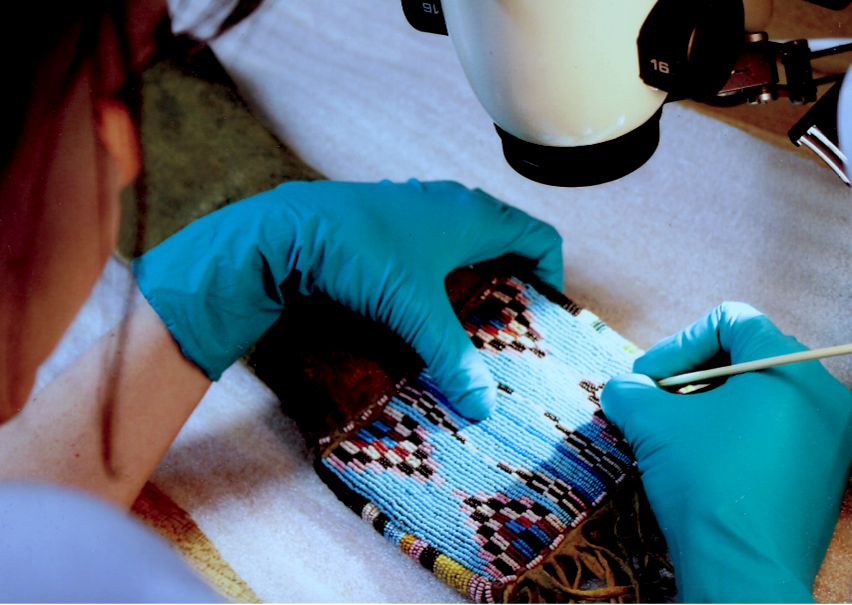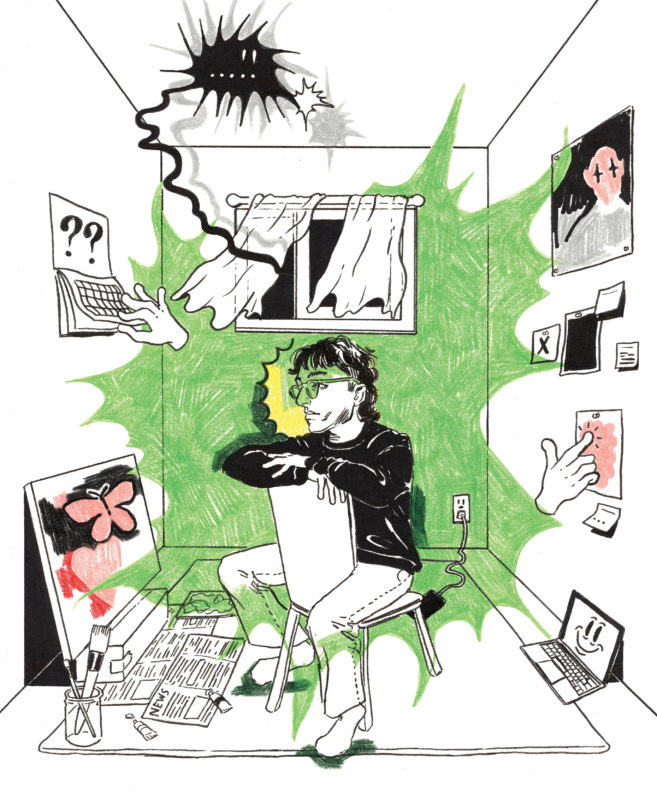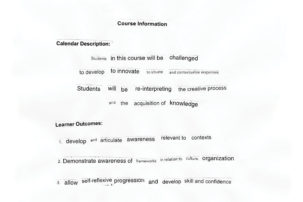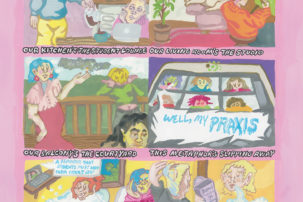Thousands of objects, artworks and documents in Canada’s public and private collections require precise, attentive care to be cleaned, restored, organized and conserved. Specialized education helps pass along this knowledge to new generations of skilled workers.
An Indigenous-Specific Heritage Program
The Aboriginal Art Certificate program at Portage College in Lac La Biche, Alberta, offers multifaceted opportunities to engage First Nations culture—including in issues of preservation, collections and repatriation.
“Students learn contemporary and traditional art forms: porcupine quilling, mocassin making, beading and sewing, hide tanning,” says dean and museum director Donna Feledichuk. “We have a collection of more than 2,000 artifacts, including the collection of Professional Native Indian Artists Inc., that we use as a teaching tool. We teach a care and collections course in part because repatriation of artworks to Indigenous communities is ongoing, and we want our students to have a sense of how to handle those artifacts.”
Artist Joseph Sanchez, of PNIAI, is the museum’s chief curator.
Canada’s Only Master of Art Conservation
Queen’s University is located in Kingston, Ontario—Canada’s first capital city—and has the unique distinction of running the only Master of Art Conservation program in the country.
There are two streams to the program: a research stream open to those with a degree in engineering or science and a treatment stream open to those with a degree and who have taken at least one studio art course. Chemistry coursework is essential for both streams. The treatment stream includes two 12-week, off-campus summer internships for hands-on experience.
Three Renowned Conservation Programs
For more than 45 years, Fleming College in Peterborough has been helping shape heritage education. Among its offerings is an intensive Cultural Heritage Conservation and Management program—the only college-level post-graduate training in cultural heritage conservation in Canada. It takes place over four consecutive semesters, and covers the handling of ceramics, wood, leather, textiles, books and other materials.
The Ryerson University MA in Film and Photography Preservation and Collections Management in Toronto also offers the opportunity to dig deep into material techniques. It’s the only program of its kind in the world, with access to the extensive Black Star Collection at the Ryerson Image Centre, and in-depth academic coursework on the history of photography and photo theory to provide essential context.
In terms of ongoing professional development for conservators, the Canadian Conservation Institute in Ottawa is key. A post-graduate internship program (with paid internships) and a visiting professionals program are available. Roving regional workshops run by the institute are offered year-round and address topics from Care of Textiles to Archaeological Conservation Field Techniques to Construction of Mannequins.
Studying Right Where You Are
Though not solely addressing conservation and archives, the Heritage Resource Management program available online and nationwide through Athabasca University offers a few different options for related study. Students without a degree can work toward a University Certificate in Heritage Resources Management, while students with an undergraduate degree can pursue either a Post Baccalaureate Diploma in Heritage Resources Management or a Master of Arts Integrated Studies degree with a focus in Heritage and Social History. Preventive conservation is an important topic in all three programs, with new courses for 2018 and 2019 in Documentation and Condition Assessment.
The University of Victoria, in its own continuing education department, offers a professional specialization certificate in Collections Management that can be completed entirely online, if needed. Caring for Museum Collections is a required course for the certificate program, as is Collections Management, with Managing Archival Collections being one of the optional course offerings.
Learning with Archives
In 1981, the University of British Columbia initiated its Master of Archival Studies, making it the first such graduate program in North America.
Even now, 37 years later, “The MAS is one of only a handful of stand-alone graduate archival degrees in North America,” states associate professor Luanne Freund. “It offers depth in both archival theory and practice.”
Among its options is a First Nations Curriculum Concentration. “The FNCC is a unique specialization that affords both Indigenous and non Indigenous students the opportunity to focus their studies on issues of importance to Indigneous communities and prepares them to work within communities,” writes Freund. Preserving oral histories and Indigenous languages are other notable topics of study and practice.
The University of Manitoba MA program in Archival Studies aims to blend the academic with the technical. Recent graduate theses from the program include “Decolonizing Provenance” by Leesha Cowan and “Picturing Archives” by Nicole Courrier.
At McGill University in Montreal, there is a Master of Information Studies available in Archival Studies, with a focus on the management of historical records in archives as well as an engagement with active collections. Further, the university also offers a Graduate Certificate in Digital Archives Management, which includes a course on Digital Curation and another on Preservation Management for digital contexts.
The University of Toronto also offers a Master of Information Studies concentration in Archives and Records Management, which includes the study of changing perspectives and social contexts as well as the role of archives in human rights and social justice.
This article is adapted from Canadian Art School Guide: Art Workers, a special print supplement in the Winter 2019 issue of Canadian Art. To download a PDF of the complete print-version guide, click here.

 A student in the Fleming College Cultural Heritage Conservation Management program attends to beadwork conservation. Photo: Fleming College.
A student in the Fleming College Cultural Heritage Conservation Management program attends to beadwork conservation. Photo: Fleming College.






